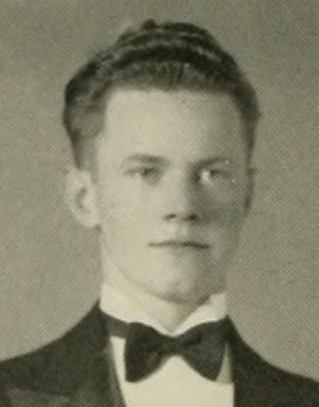
A native of Pink Hill, Lenoir County, George Willard graduated from ECTC in 1937. In making public education his lifework, Willard distinguished himself as one of the most progressive school administrators in eastern North Carolina, successfully guiding the Wilson City School System from segregation to integration. Willard’s contributions to campus culture as an undergraduate in the 1930s and later as a school superintendent distinguish him as one of East Carolina’s outstanding alumni.
While an undergraduate at ECTC, Willard served as vice-president of the Science Club, a representative on the Men’s Student Council, manager of the Varsity Basketball Team, sports editor for the Teco Echo, and then, his senior year, as editor-in-chief of the Teco Echo. Willard was also a member of the Varsity Club his junior and senior years, and of the Lanier Society, Tau Sigma Sigma, and Phi Sigma Phi. He was voted “Most Dependable” in the Class of 1937, the only man to receive superlative honors.
Willard’s work with the Teco Echo was his most significant. As sport’s editor, Willard oversaw an explosion in coverage of men’s athletics. During his tenure, the Men’s Athletic Association adopted “the Pirate” as the official identity for men’s teams. While team uniforms still branded men’s teams as “the Teachers,” the Teco Echo invariably referred to them as the Pirates, thus pioneering Pirate Nation discourse. Later, as editor-in-chief, Willard oversaw front page sports coverage, including a full-length picture of head coach Bo Farley in football uniform, with “Pirate” imagery dominating the top fold headline. While commonplace today, in 1937 such editing was unprecedented at ECTC.
Willard was the first male editor-in-chief and often gave prominence to male issues. Among other things, the Teco Echo advocated adequate space for men on campus, frequently criticizing the cramped basement quarters resident men were then confined to. On racial topics, the Teco Echo appeared forward-thinking, publishing an essay by a “colored [high school] student” who had recently attended an ECTC science exhibit. Willard, a science and math major, likely had a hand in publishing the essay, one breaking with the dominant campus culture, still defined by the school’s segregationist charter. The Teco Echo also praised a dramatic performance by UNC-Chapel Hill’s Carolina Playmaker’s, staged in the Robert H. Wright Auditorium, of a Fred Howardplay that depicted the tragic brutality of sharecropping.
In another issue, the Teco Echo published an excerpt from the Journal of Negro Education citing statistics calling for more junior colleges for African-Americans. Willard also oversaw inclusion of an illustrated “Campus Camera” feature on George Washington Carver, giving unprecedented prominence to African-American accomplishments. Willard’s tenure as editor-in-chief concluded with news that the National Scholastic Press Association had awarded Teco Echo its First Class Honor Rating, eliciting praise for the paper from U.S. Senators, congressmen, and local political leaders as well. In stark contrast with Willard’s Teco Echo, the 1937 Tecoan featured an Old South motif, presenting one of the most condescending expressions of Jim Crow culture in East Carolina’s history.
Following his graduation from ECTC, Willard taught science in Wilson, N.C., from 1937-1939. He then pursued graduate study at N.C. State College in Raleigh, completing a master’s degree in education in 1942. After returning to public school instruction, Willard served as principal of the Charles L. Coon and Ralph L. Fike high schools between 1945 and 1959, before becoming superintendent of the Wilson City School System in 1959, a position he held until retirement in 1976. As superintendent, Willard oversaw the desegregation of the reluctant Wilson City School System. In guiding Wilson schools towards integration, Willard sought to work with ECU in offering courses designed to assist in-service teachers with the transformation. Willard also corresponded with ECU President Leo W. Jenkins regarding the need to develop materials for secondary schools educating students about the virtues of democracy as compared with the failings of communism.
Willard’s extraordinary work as editor of the Tecoan coupled with his progressive wisdom as an educator and administrator distinguish him as one of the most exceptional students to have emerged from East Carolina in the service of education and social progress.
Sources
- “Campus Camera: Dr. George W. Carver.” Teco Echo. Vol. 13, no. 9. February 25, 1937. P. 2. https://digital.lib.ecu.edu/38052
- “Colored Student Writes Essay For Teco Echo.” Teco Echo. Vol. 12, no. 13. May 13, 1936. P. 4. https://digital.lib.ecu.edu/38042
- “Educational Trends.” Teco Echo. Vol. 13, no. 5. December 14, 1936. P. 2. https://digital.lib.ecu.edu/38048
- George S. Willard, Jr., Papers (#543), East Carolina Manuscript Collection, J. Y. Joyner Library, East Carolina University, Greenville, North Carolina.
- “National Capitol Leaders Join in Congratulating ‘Teco Echo.'” Teco Echo. Vol. 13, no. 14. May 20, 1937. P. 1. https://digital.lib.ecu.edu/38057
- “Pirates Accepted As Official Name For Teachers.” Teco Echo. Vol. 10, no. 9. February 28, 1934. P. 3. https://digital.lib.ecu.edu/38014
- “Pirates Primed To Make Louisburg ‘Walk Plank’ On Saturday Afternoon.” Teco Echo. Vol. 13, no. 4. November 19, 1936. P. 1. https://digital.lib.ecu.edu/38047
- “Playmakers Are Well Received.” Teco Echo. Vol. 13, no. 4. November 19, 1936. P. 2. https://digital.lib.ecu.edu/38047
- “Senior Superlatives.” Teco Echo. Vol. 13, no. 5. December 14, 1936. P. 1. https://digital.lib.ecu.edu/38048
- “Tau Chapter of Phi Sigma Pi.” Teco Echo. Vol. 13, no. 5. December 14, 1936. P. 6. https://digital.lib.ecu.edu/38048
- “Teco Echo.” Tecoan. 1937. P. 164. https://digital.lib.ecu.edu/15342
- “Teco Echo Given Highest Rating in Nation Contest.” Teco Echo. Vol. 13, no. 1. April 29, 1937. P. 1. https://digital.lib.ecu.edu/38056
- Tecoan. 1937. https://digital.lib.ecu.edu/15342
Citation Information
Title: George Sylvester Willard, Jr.
Author: John A. Tucker, PhD
Date of Publication: 7/12/2019